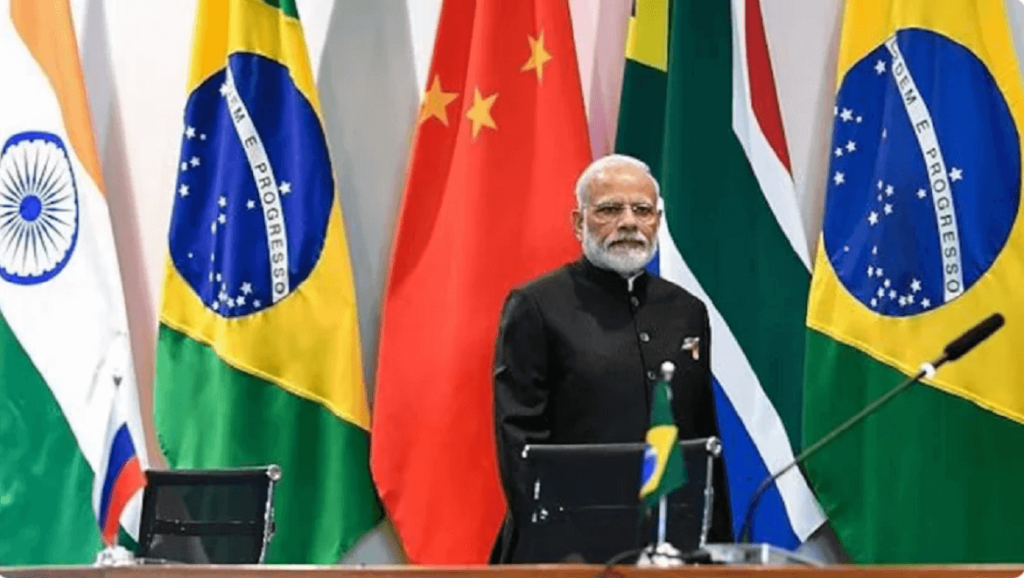World Geostrategic Insights interviews Dr. Monish Tourangbam on India’s role inside BRICS and its significance for Indian foreign policy, the dynamics of India-China relations within the group, and the prospects for India-Russia relations.

Dr. Monish Tourangbam is a New Delhi based Strategic Analyst and the Honorary Director of the Kalinga Institute of Indo-Pacific Studies. He is a regular commentator on International Affairs and Indian Foreign Policy.
Q1 – The recent resurgence of BRICS on the global multilateral scene is often attributed to the Sino-Russian pair. Has India also played an important role in this emergence? What is India’s position within the BRICS? What does it represent for India’s foreign policy? Can it be seen as instrumental in pursuing the overriding goals of Modi’s diplomatic doctrine, such as strategic autonomy?
A1 – First and foremost, it will be wrong to attribute the resurgence of BRICS to the Sino-Russian partnership. It would have been naïve to imagine the evolution of BRICS without India’s sustained economic rise, and its intention to collaborate with countries that share similar concerns for reforms in the West dominated global financial order, notably the World Bank and the International Monetary Bank.
The expansion of the BRICS is indeed a new chapter in the evolution of this trans-regional and multilateral platform, and the moment is ripe with multiple presumptions and speculations. Such an expansion also comes at a time of general crisis in multilateralism, a growing U.S.-China great power rivalry, further rifts in U.S.-Russia adversarial relationship, India-China relations nosediving, burgeoning India-U.S. partnership in the Indo-Pacific and a rising Sino-Russian alliance.
Therefore, the expansion and more particularly the inclusion of new members, such as Iran has led to hasty conclusions that the BRICS, is bound to take an anti-West and China dominated turn, to the detriment of India, which currently finds geostrategic convergence with the West in general, and the United States in particular.
However, India’s foreign policy is grounded in a peculiar understanding of its own geography and history. India’s colonial past, the Cold War period, aspirations in the 21st century plus experiences of dealing with powers far and near has shaped the way New Delhi engages with the world.
The practice of strategic autonomy has guided India’s foreign policy from the times of non-alignment to the current era of multi-alignment, to protect and promote India’s national interest while vouching for a greater global good.
In the words of India’s Foreign Minister, S. Jaishankar, “this is a time” for New Delhi “to engage America, manage China, cultivate Europe, reassure Russia, bring Japan into play, draw neighbours in, extend the neighbourhood and expand traditional constituencies of support.” Doing so will not be a walk in the park, but it will continue to be inevitable and worth pursuing. China’s current economic size and its overwhelming influence in groupings like the BRICS is palpable, but the story of effective global governance, to which a heterogeneous group like the BRICS aims to contribute, cannot be achieved with unilateralism and undue assertiveness.
The past, present and future of BRICS has the imprint of India’s growth story and New Delhi needs to build a new consensus by reshaping multilateral aspirations, helping build bridges between the Global South and North, and by reimaging how the rise of the non-West need not be antithetical to the West.
Q2 – Relations between India and China within the BRICS have been characterized by cooperation and competition. It does not seem easy for India to assume a prominent role inside the group, given China’s overwhelming economic, political, and diplomatic weight. Above all, the Johannesburg summit demonstrated how difficult it is to compete with and oppose China. How do you see the dynamics of India-China relations within the group and how might it affect the future of BRICS? Considering also that most of India’s current challenges are associated with China, could a hardening Sino-Indian rivalry limit the BRICS’ ability to formulate a coherent vision of its role and mission in global governance reform?
A2 – Despite inherent geopolitical challenges, India and China have remained the two most important pillars of the BRICS grouping, based on their respective economic growths and visions of reshaping global governance in the 21st century. Therefore, the India-China relationship within the BRICS and other multilateral platforms cannot and should not be seen as a zero-sum game. It is a complex dynamic of competition and cooperation.
The current reality of the relationship, post the violent Galwan clash, is marred by animosity and a deepening lack of trust. China’s rise mixed with the current leadership’s anxiety to maintain an iron grip on political power at home, have given birth to an aggressive behaviour externally that New has had to manage with a show of force at the borders, and simultaneous diplomatic adroitness.
In recent times, Beijing has shown its ambitions to build a unipolar Asia and reorganise multilateral platforms to suit its parochial interest at the cost of regional peace and stability.
Unfortunately, the rise of BRICS cannot transpire in a geopolitical vacuum, and hence regional conflicts, inter-state rivalries and national security considerations will affect economic interdependence plus multilateral imperatives. The continuing wars in Europe and West Asia have upended regional security orders with implications for re-alignment of international partnerships, and BRICS includes powers at the very centre for this reordering. To what extent such divisions will influence the purpose and mechanisms within BRICS remains to be seen.
Moreover, the expansion of BRICS and its future will play out amidst the overriding geopolitical and geo-economic forces in the Indo-Pacific region, of which India and China are primary actors. The strategic contest between the United States and China has grown more intense and comprehensive, while the India-China economic interdependence and sporadic moments of camaraderie have failed to overcome differences that are more fundamental.
Clearly, China possesses more material capabilities compared to any other member within the BRICS and its aggressive push for a global status commensurate with the United States is apparent. To what extent this dynamic will translate into Beijing finding means to promote its own interests within BRICS will remain the major question for India’s policy vis-à-vis BRICS and the future of the grouping as a whole.
Therefore, BRICS faces a conundrum —how can it balance common interests with competition or power politics within the group? The growth of Chinese national power across the spectrum has required Delhi to recalibrate its own development of national capabilities and partnership with other powers. As the world debates new equations of the Global North and South, New Delhi should position itself as a voice of reason and help maintain the true calling of BRICS as a forum of South-South cooperation for common prosperity and not an anti-West bloc.
Q3 – In recent years, India has sought to strengthen its ties with Russia through various diplomatic initiatives. Now, India can no longer rely on Russia to counterbalance China. Among other things, Russia’s war effort in the Ukraine is delaying the delivery of Russian military equipment to Indian armies at a time when they are intensifying their deployment along the border with China. Does Russia’s weakening since the invasion of Ukraine and its increasing dependence and alignment with China, within the BRICS and in the broader context of global politics, pose a strategic challenge, a threat, to India?
A3 – The geopolitical forces seem to be blowing against the India-Russia relationship, as it faces the current reality of a growing U.S.-China rivalry, a new low in India-China relationship, a burgeoning India-U.S. partnership and a growing China-Russia strategic alliance. Despite a strong background of historical convergences and the lack of any fundamental differences, New Delhi and Moscow need to find a strategic relevance in the larger scheme of things, beyond the strength of the bilateral defence trade.
As India shows and implements the need for diversity in procuring its defence hardware and developing closer working relationships towards co-development and co-production with other partners, particularly the United States, the lure of India-Russia defence ties will have to face the pitfalls of geopolitics. The world stands at the cusp of a geopolitical, geo-economic and technological shift that is making countries, big and small, reorient their strategies to deal with the opportunities and risks.If the webs of interdependence among countries are inevitable, so are the new lines of division. India’s growing closeness to the Quad countries multilaterally as well bilaterally are not spur of the moment reactions but are calculated responses to these tectonic shifts over the years.
As India undergoes a new test of choices and partnerships in the international system, it shows an intention to practice its strategic autonomy despite challenges. For instance, Foreign Minister Jaishankar’s visits to Russia and Iran, both hard-core adversaries of the United States, shows that New Delhi will find its own contours of relationships, and not necessarily identify with America-centric threat perceptions.
Moreover, with the India-U.S. defence partnership at an all-time high, New Delhi has gone ahead with major defence deals with Moscow. As far as matters of recent delays in Russian supplies of defence materials to India is concerned, such temporary glitches are not being seen as a major dampener in the relationship, but rather as a call for India’s need to move more vigorously towards a level of self-reliance in defence production, and reducing dependence on imports. Commenting on his recent visit to Russia, India’s Foreign Minister emphasised that India values “this relationship” and “it is a relationship that served India well.” “I am looking at it from an Indian perspective…A country which has maximum friends and minimum adversaries is obviously one with smart diplomacy. Why would a country restrict its friends?…Why would it choose to unless the interest compelled it to do that? I am focusing on how to expand my relationships,” he said.
Dr. Monish Tourangbam – New Delhi based Strategic Analyst and the Honorary Director of the Kalinga Institute of Indo-Pacific Studies.







